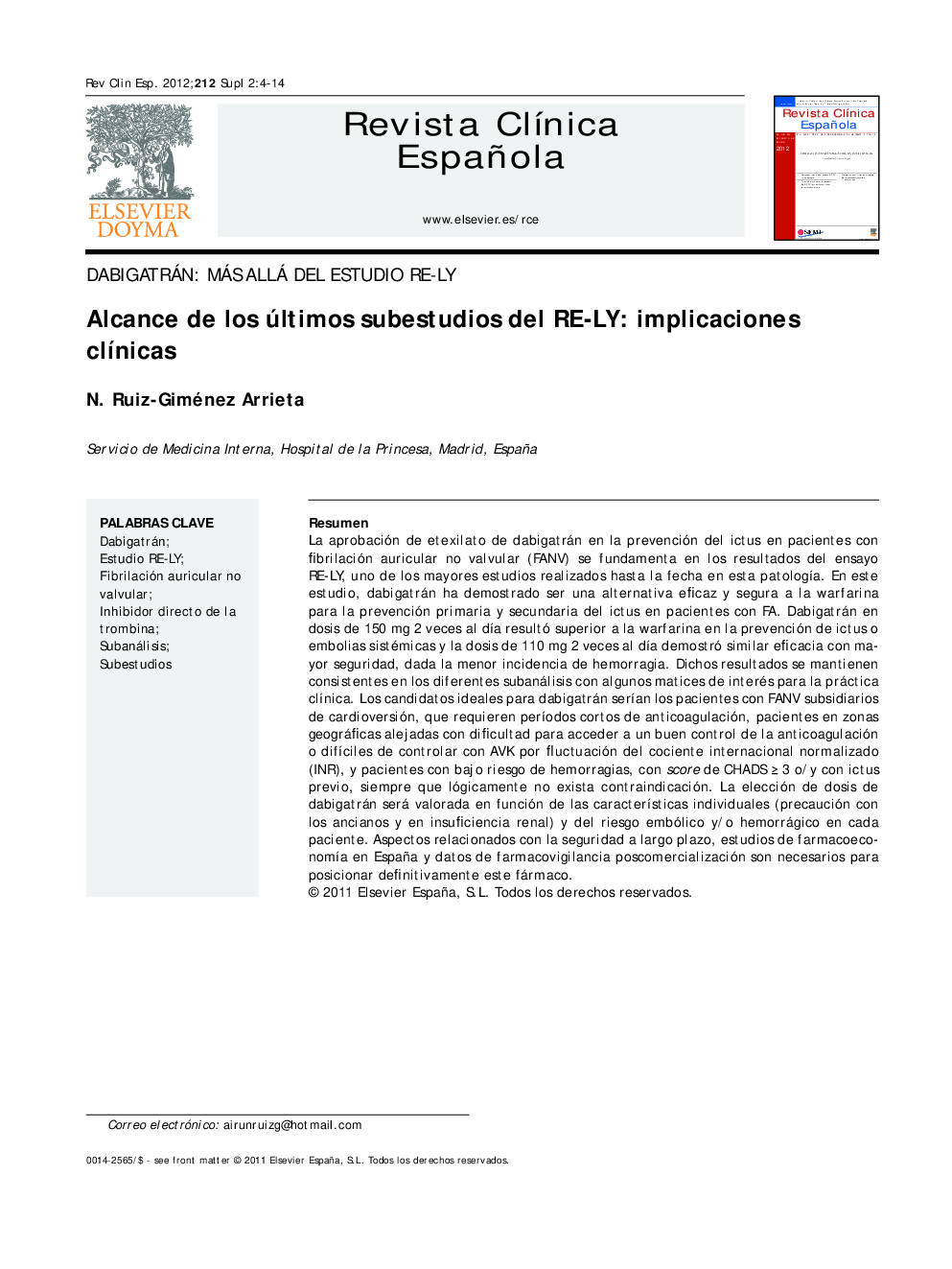| کد مقاله | کد نشریه | سال انتشار | مقاله انگلیسی | نسخه تمام متن |
|---|---|---|---|---|
| 3827680 | 1246944 | 2012 | 11 صفحه PDF | دانلود رایگان |

ResumenLa aprobación de etexilato de dabigatrán en la prevención del ictus en pacientes con fibrilación auricular no valvular (FANV) se fundamenta en los resultados del ensayo RE-LY, uno de los mayores estudios realizados hasta la fecha en esta patologÃa. En este estudio, dabigatrán ha demostrado ser una alternativa eficaz y segura a la warfarina para la prevención primaria y secundaria del ictus en pacientes con FA. Dabigatrán en dosis de 150 mg 2 veces al dÃa resultó superior a la warfarina en la prevención de ictus o embolias sistémicas y la dosis de 110 mg 2 veces al dÃa demostró similar eficacia con mayor seguridad, dada la menor incidencia de hemorragia. Dichos resultados se mantienen consistentes en los diferentes subanálisis con algunos matices de interés para la práctica clÃnica. Los candidatos ideales para dabigatrán serÃan los pacientes con FANV subsidiarios de cardioversión, que requieren perÃodos cortos de anticoagulación, pacientes en zonas geográficas alejadas con dificultad para acceder a un buen control de la anticoagulación o difÃciles de controlar con AVK por fluctuación del cociente internacional normalizado (INR), y pacientes con bajo riesgo de hemorragias, con score de CHADS â¥Â 3 o/y con ictus previo, siempre que lógicamente no exista contraindicación. La elección de dosis de dabigatrán será valorada en función de las caracterÃsticas individuales (precaución con los ancianos y en insuficiencia renal) y del riesgo embólico y/o hemorrágico en cada paciente. Aspectos relacionados con la seguridad a largo plazo, estudios de farmacoeconomÃa en España y datos de farmacovigilancia poscomercialización son necesarios para posicionar definitivamente este fármaco.
The approval of the use of dabiatran in stroke prevention in patients with nonvalvular atrial fibrilation (NVAF) is based on the results of the RE-LY (Randomized Evaluation of Long-Term Anticoagulation Therapy) trial, one of the largest studies to date in this entity. In this trial, dabigatran showed similar safety and efficacy to warfarin in primary and secondary prevention of stroke in patients with AF. At a dose of 150 mg twice daily, dabigatran was superior to warfarin in the prevention of stroke or systemic embolism and the 110 mg dose twice daily showed similar eficacy and greater safety, given the lower incidence of hemorrhage. These results were consistently found in the various subanalyses, with some slight differences of interest for clinical practice. The ideal candidates for dabiatran are patients with NVAF suitable for cardioversion, who require short periods of anticoagulation, patients in remote geographical areas with difficulty in achieving good anticoagulation control or good control with anti-vitamin K treatment due to IRN fluctuations, and patients with a low risk of hemorrhage and a CHADS score â¥Â 3 and/or with prior stroke, whenever there are no contraindications. The choice of dabigatran dose should be evaluated according to the patient's individual characteristics (caution must be exercised when prescribing this drug in the elderly and in renal insufficiency) and embolic and/or hemorrhagic risk. Studies of the long-term safety of this drug, pharmacoeconomic analyses in Spain and post-commercialization pharmacovigilance data are required before the definitive uses of this drug can be established.
Journal: Revista ClÃnica Española - Volume 212, Supplement 2, March 2012, Pages 4-14